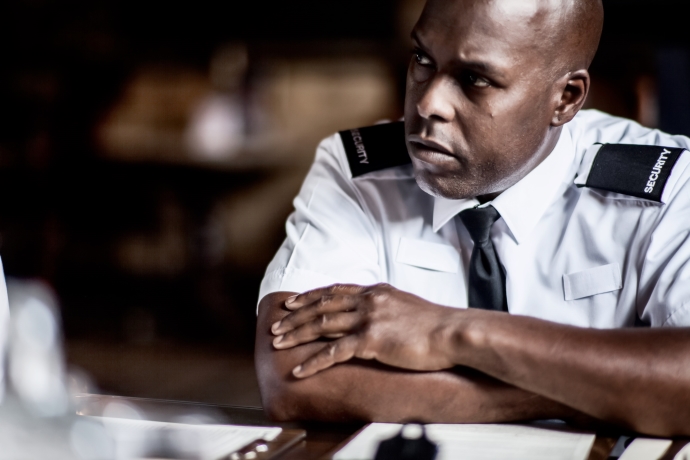Case study introduction
Colin Green is the security manager of Southern Railway who, when first looked at the introduction of body worn cameras, managed a team of Rail Neighbourhood Officers operating on trains and stations in the south of England. Colin is looking into the feasibility of purchasing more Reveal body worn cameras in the future to make the equipment personal issue.

“I became aware of the need to gather evidence when on shift and the need to have a tool which would act as a deterrent. We had certain powers as Rail Neighbourhood Officers, but there was only so much we could do – there was a big need for gathering evidence.
“So I did some research looking for the sort of thing we utilise needed and found Reveal Media. I asked them if they had something suitable that could be used to collect evidence and to be used as a deterrent. They did indeed have exactly what we were looking for.
“We quickly realised it wasn’t just about cameras, but also about data management, and the software called DEMS that came with the cameras was soon something that we found we couldn’t do with without.
“To get the project off the ground, funding was necessary from network rail for the cameras in the first place. Network Rail thought the product was so good they bought some cameras themselves! They started using them for rail crossing patrols after I advised them that the video was secure for prosecutions, had a time saving element, provided good evidence which encourages early guilty pleas and means people can be charged more easily.
How have the cameras made a difference?
“There is an increased visibility with the cameras. Our security staff wear hi-vis jackets a bit like the police, which can sometimes be provocative when dealing with drunk or aggressive people, they just don’t like the uniform. However, when we introduced the cameras people would ask “is that on?” and their behaviour changed, even when the cameras weren’t on, so the cameras made a difference immediately.
“The first time we used the footage as evidence, the person concerned was shown the video, pleaded guilty, accepted the penalty notice and that was that. It was all down to the use of the camera. After that, I understood that I could not afford not to have them.
“The volume and quality of sound is superb on the RS3-SX. So is the HD video quality. Even in low light, which is where most of our patrols and work takes place, it doesn’t affect the quality. It’s a more robust camera too.
What do you think of DEMS?
“DEMS is so easy to use – even for non-technical people. It makes data collection so easy and reliable. Things are laid out in a simple way and all you have to do is click the videos you want and press a few buttons.
“The upgrades are fantastic, we’re on DEMS 3 now.”
“The whole thing has been excellent”
What do you think of the front facing screen?
“The front facing screen is brilliant. You know you’re being recorded when you can see yourself on a screen. And it’s remarkable the difference between CCTV and body cameras. We have CCTV in all trains and on all stations, but it’s completely different when somebody is standing in front of you with a camera. Not only does it defuse situations, but people then start apologising.
How about the articulated head?
“The articulated camera head is spot on. We have different sized people here, all different builds, shapes and sizes. And all of them are in different situations that change throughout the day. So it’s vital that we capture the right images, perfectly framed. We’re also able to turn the camera head around if it makes some people feel uncomfortable.
“We had a confrontation where the person in question was very distressed by the camera, so we were able to turn the camera head around and continue recording audio with the option of turning the camera head round again if needed.
“The cameras are fantastic value for money. If you want the best, then you pay for the best, but there are other cameras out there where you pay a similar price but get half the product.
What have you learned because of the project?
“There was a big learning curve when we initiated the project. It was a lot more complicated than you might think. It’s not just about buying cameras, attaching them to people and filming things. We had to think about policies for everything: data protection, using cameras, when to film, when to stop filming, what to do with the footage once it had been filmed.
“We also quickly learned that we needed the docking stations for a stable filming platform.
“We also needed to train our staff on how to use them. There was some hesitance to use them at first because it was assumed that people would play up to the camera and make confrontations worse. As it turned out, the cameras had the opposite effect.
Are you able to share any statistics?
“It’s difficult to measure its success because we are in the process of gathering meaningful statistics, but the four times we have used it to prosecute, it’s worked. I would say it makes a massive difference and I would not take them away now, I actually am hoping to get some more.
How have you found working with Reveal?
“Reveal have been incredibly helpful all along. They bent over backwards to get a project up and running for us. We originally had some problems mounting the cameras on our uniforms. The glue wasn’t strong enough on the klickfast attachment, but we had them sent back and Reveal came up with a much stronger solution for us.
Learn more about the RS3-SX Body Worn Camera.
